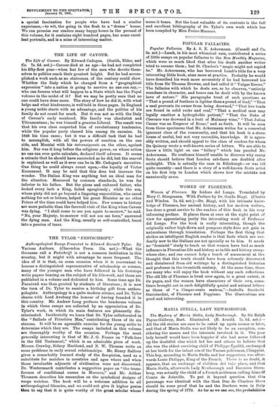POPULAR FALLACIES.
Popular Fallacies. By A. S. E. Ackermann. (Cassell and Co. 68. net.)—Lamb, in his most whimsical vein, contributed a series of little essays on popular fallacies to the New Monthly Magazine, which were so much liked that after his death another writer tried to resume them ; but St. Charles's "magic might not copied be." Mr. Ackermann, who has borrowed Lamb's title for a very interesting little book, aims more at practice. Probably he would have described his work more accurately if he had borrowed his title from Sir Thomas Browne, and had called it" Vulgar Errors." The fallacies with which he deals are, as he observes, "entirely mundane in character, and hence can be dealt with by the known laws of nature." His paragraphs treat of such questions as "That a pound of feathers is lighter than £ of lead," "That a caul prevents its owner from being drowned," "That live toads are found in solid rocks and coal," "That a medical man may legally smother a hydrophobic patient," "That the Duke of Clarence was drowned in a butt of Malmsey wine," "That Julius Caesar was an Emperor of Rome," and so forth. It will be seen from these specimens that Mr. Ackermann writes for a somewhat ignorant class of the community, and that his book is a store- house of useful, but not very recondite, knowledge. It is agree- ably written, and should appeal to the class of readers for whom De Quincey wrote a well-known series of letters. We are able to throw a little light on one "fallacy" which has puzzled Mr. Ackermann. He confesses himself unable to discover why canny Scots should believe that London cab-fares are doubled after midnight. This is actually the case in Edinburgh—or was till quite recently—and there is a story of a well-known Scots artist on his first trip to London which shows how the mistake not unnaturally arose.




















































 Previous page
Previous page